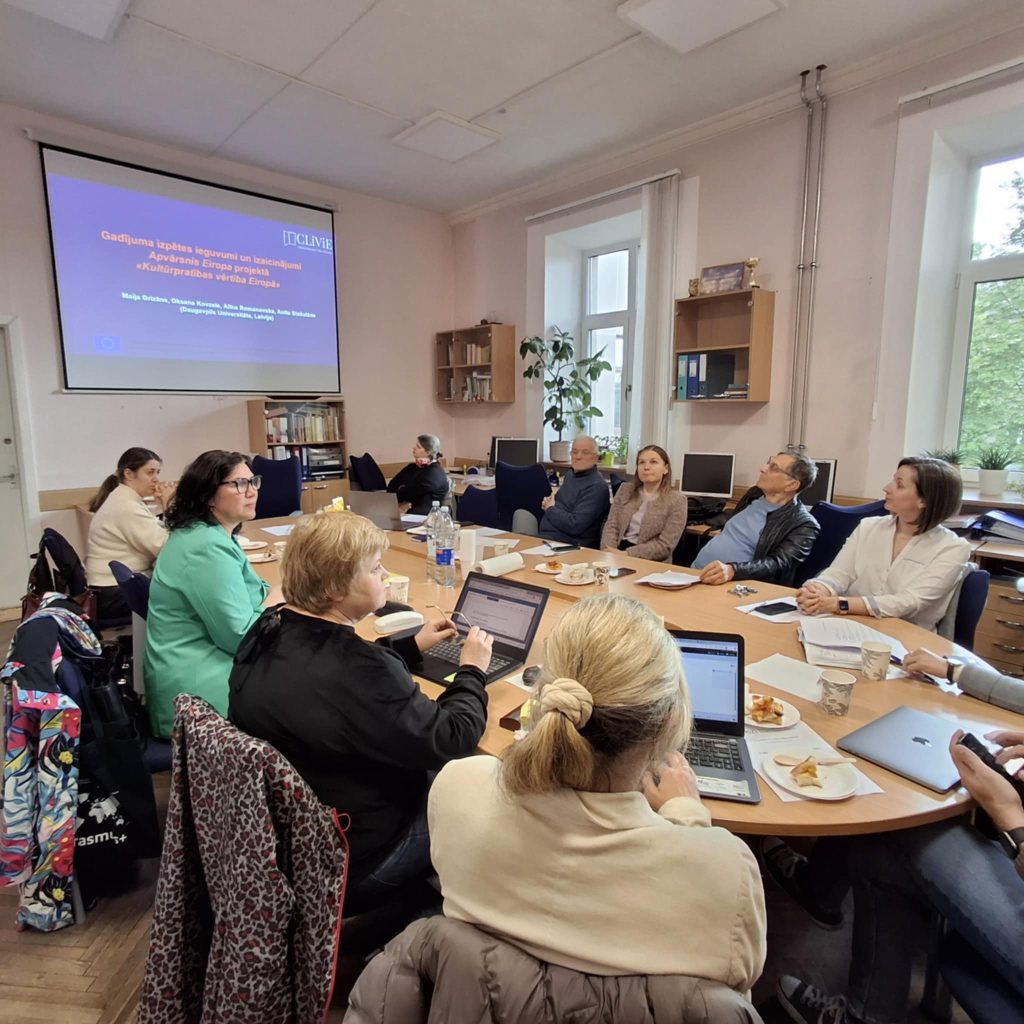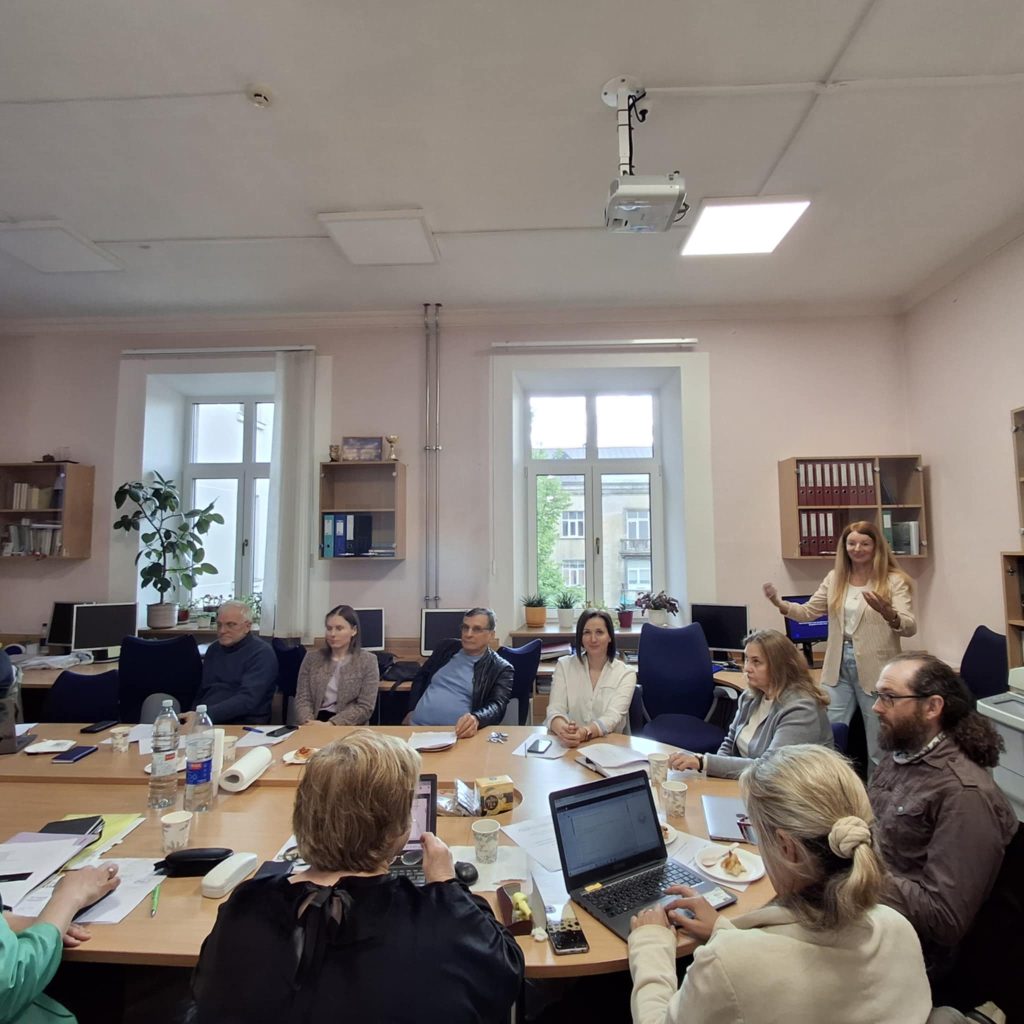On May 12, 2025, the 10th scientific seminar of the Institute of Humanities and Social Sciences (IHSS) at Daugavpils University took place, titled “Latgale’s Past, Present, Future: Experience and Perspectives of Interdisciplinary Studies.” At the seminar, IHSS researcher and lecturer Maija Grizāne, leading researcher Oksana Kovzele, leading researcher and associate professor Alīna Romanovska, and leading researcher and professor Anita Stašulāne presented the key activities of the Horizon Europe program project Cultural Literacies’ Value in Europe (CLiViE) in formal and non-formal educational institutions.
The presentation focused on the challenges related to applying the Theory of Change (ToC) and social return on investment (SROI) methodologies to assess how arts-based cultural education contributes to social cohesion.
To evaluate the effectiveness of arts-based education and determine its relevance and economic benefits, four case studies are being implemented within the Horizon Europe project “Cultural Literacies’ Value in Europe”. In these case studies, researchers from Daugavpils University collaborate with formal and non-formal educational institutions and will consult with the project’s official partners from European universities and cultural institutions.
The case study “The Other in Art and Life” (project researcher – A. Romanovska) is being implemented in cooperation with the Mark Rothko Art Centre in Daugavpils; it’s aim is to develop young people’s cultural awareness, creative self-expression, and critical thinking skills.
During the case study workshops, participants explored the manifestations of surrealism in the works of Jan Švankmajer and Eva Švankmajerová (the Czech Republic); created assemblages from recycled materials; deepened their understanding of Rothko’s paintings and his place of origin; learned about the “invisible” side of the work of the museum, such as the nuances in planning exhibitions and maintaining the collection; got acquainted with the role of a curator and the knowledge and skills required for it; and engaged in creative expression through painting activities led by professionals.
For more information, please see these press releases: 1, 2, 3, 4, 5.
The case study “Learn from Ancestors to be Open and Self-Confident in the Future!” (project researcher – O. Kovzele) is being implemented in cooperation with Daugavpils Secondary School of Opportunities, with the aim of exploring how creative collaboration in craft workshops, led by professionals, can expand school learners’ knowledge of traditional Latvian crafts and cultural values, as well as promote their interactive skills and respect for “the other”.
During the case study workshops, participants learned about traditional musical instruments in Latvia and created their own sound devices; listened to a presentation about Latvian national dishes and prepared a layered rye bread dessert; created traditional animal masks, as well as acquired the technique of birch bark weaving; and made felted soaps.
For more information, please see these press releases: 1, 2, 3, 4, 5.
The case study “Polish Cultural-Historical Heritage in Daugavpils” (project researcher – M. Grizāne) is being carried out in cooperation with the J. Pilsudski Daugavpils State Polish Gymnasium. Its aim is to promote an in-depth understanding of the cultural and historical heritage of the Daugavpils region and to enhance young people’s appreciation of the value and diversity of past events. As part of the project, 11th-grade students developed a Kahoot game titled “Polish Cultural-Historical Heritage” that allows users to test their knowledge about prominent Polish figures, historical events, monuments, and the current activities of the Polish diaspora.
For more information, please see this press release.
The case study “Together we Rise” (project researcher – I. Presņakova) is being implemented in collaboration with the organization “HVARAN” and the Latgale Taekwondo Center “Jitai”. Its aim is to promote and develop identity awareness, interpersonal relationships, and a sense of belonging, as well as to analyze multiple levels of identity and their significance in building relationships with others. During the course of the case study, participants engage in activities that include team-building tasks, the development of emotional intelligence, creative reflection, and cultural exploration. Children take part in structured sessions that include physical activities, learning about local history and culture, such as excursions to the city’s most significant historical sites and symbolic landmarks. A significant component of the case study is children’s self-expression and participation – they create symbolic artworks, share their reflections, and engage in discussions about the importance of cultural traditions and intergenerational connections. The involvement of family members, especially parents, in project events fosters the community cohesion and strengthens family values. The activities will continue throughout the duration of the case study, providing children with the opportunity to learn through personal experience, collaboration, and shared creative engagement, thereby strengthening their sense of belonging to their city and culture.
For more information, please see these press releases: 1, 2, 3.
CLiViE project homepage: https://www.clivieproject.eu
The project is supported by the European Union’s “Horizon Europe” Research and Innovation programme under the grant agreement No. 101132285.
Further information:
Project coordinator at Daugavpils University Alīna Romanovska
alina.romanovska@du.lv



